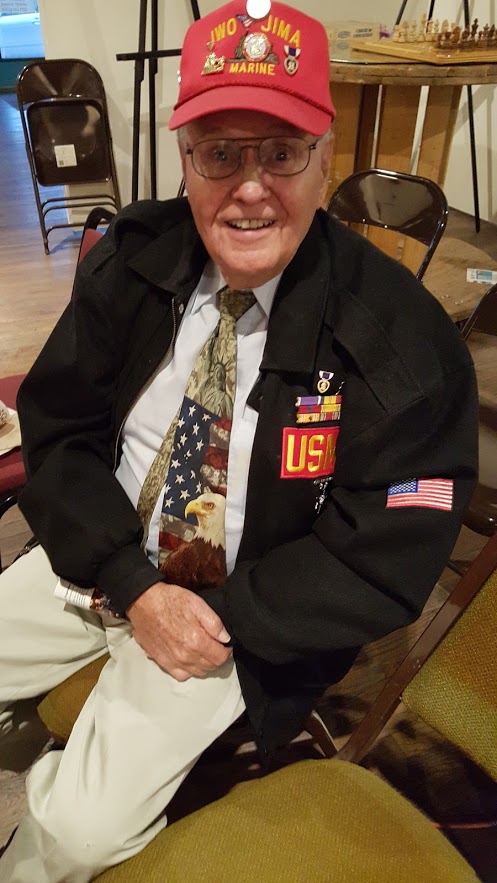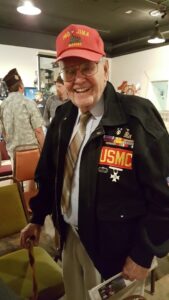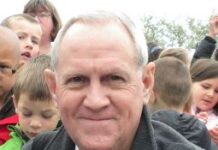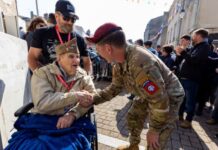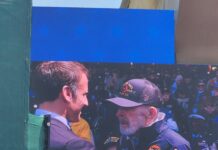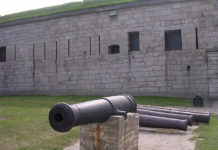Don Whipple grew up on a farm in western Kansas, never realizing he would play a role in one of the most famous battles in United States history.
Whipple, now 95 and living in the Denver area, grew up during the Depression as a member of a large family. He attended a one-room school house.
He persuaded his parents to sign the papers for him to enlist in the Marines—as he was not yet 18 years old and right out of high school. He joined the new 5th Marine Division, which was made up of both combat veterans and new recruits. Some of the veterans were from the 1st Marine Parachute Regiment, Raider Training Battalion, parachute training schools and replacement companies.
The division moved to Hawaii to continue training at Camp Tarawa. At Christmas, while training in Hawaii, Whipple learned, by telegram, that his father had been killed in a car accident in August 1944. It was a devastating moment for Whipple, who sailed with the division to fight on Iwo Jima a few months later.
The 5th Marine Division fought on Iwo Jima from its initial landing on 19 February to 26 March, 1945, before returning to Hawaii. The initial landings were southeast of Mount Suribachi.
The division paid a terrible price on Iwo Jima, with 2,482 killed in action, 19 missing and 6,218 wounded, including Don Whipple. It was the highest casualty rate among the three attacking Marine divisions.
On Iwo Jima, the division earned 17 Medals of Honor (15 Marines and two Navy corpsmen). Twelve of these medals were awarded posthumously. In addition, the unit was awarded the Presidential Unit Citation as part of the Fifth Amphibious Corps.
The 5th Marine Division was to be part of the invasion of Japan under Gen. Douglas MacArthur and the 10th Army, but Japan surrendered after the dropping of the atomic bombs. After the surrender, the 5th Marine Division landed at Sasebo. Whipple and his unit had occupation duty in Nagasaki, which recently was leveled by the atomic bomb.
To this day, Whipple carries Iwo Jima with him. Literally. Six months before this interview, he rubbed his knee joint and a small sliver of steel shrapnel fell out into his hand. In 1953, he had an operation to take another ragged piece of shrapnel out of his leg. “People wanted me to keep it as a souvenir, but I just threw it away,” Whipple said.
Whipple, a member of Denver’s Veterans of Foreign Wars Post No. 1, frequently speaks to high schools about his experiences on Iwo Jima to let students understand the importance of not forgetting the sacrifices made there. He also assists younger veterans who served in Afghanistan and Iraq.
Whipple was honored, with other Colorado Iwo Jima veterans, by President Trump and Vice President Mike Pence when they came to the state in early 2020.
Interviewer: When did you decide to join the Marines?
Whipple: I had three older brothers in the Navy. I had read books like They Were Expendable, which was interesting. I saw a picture on the cover of the Saturday Evening Post about the Marines at Guadalcanal. It seems that was where the excitement was. I graduated from high school, then boarded a train the next to Denver to enlist in the Marines.
“I returned to Kansas and worked on the farm because the Marines didn’t call me up until August. My brother and I were the same size and joined at the hip. We were very competitive. We would break horses for ranchers to ride and that gave us spending money. We were the last of the real American cowboys.”
Interviewer: Where did you train and for how long?
Whipple: When we got into San Diego for training at midnight, the whole area at the Marine base had camouflage netting. A Marine came and told us, ‘Welcome to San Diego Marine Base, if you want to know where the head is, it is over there,’ and he pointed. I had no idea what a head was. I thought was the commander, but found out it was the toilet. We were assigned huts, marching everywhere initially in civilian clothes. I remembered seeing a lot of older Marines at the Marine Depot, with their rifles stacked, asking us where we were shipping out to and then telling us, ‘you’ll be sorry.’
“I had no idea how tough the training was going to be. I got through it in good shape. The 30-foot drop into a pool was a challenge to me. After boot camp, I went to Communications School where I learned radio and telephones and to lay wire. At Camp Pendleton, I also became an artillery forward observer. I was assigned to the 13th Marines, which is an artillery unit. We had veterans of Guadalcanal and other campaigns with us.
“We trained to go over the side of a ship into LCVPs [Landing craft, vehicle, personnel]. We would load up and do it again. Some of our exercises were out on Coronado Island. One day we were told, when big limousines rolled up, that President Roosevelt was there. We practiced an amphibious landing. We had a final inspection where our packs and other equipment had to be ready.
“We boarded troop ships with no idea where we were going. We sailed to Hawaii. This is the first time I had ever been on the ocean. Even most of the lakes in Kansas are not natural.”
Interviewer: What do you do in Hawaii?
Whipple: Six-to-eight months were spent on the big island of Hawaii training. We trained there at Camp Tarawa, on the far end of Hilo. There was a lot of volcanic sand and dirt. It was the nearest thing to Iwo Jima, which they call Sulphur Island.
“It was just exciting time for us teenagers. Years later, President Reagan said that World War II was won by a bunch of teenagers.”
Interviewer: When did you know you were going to Iwo Jima?
Whipple: “We shipped out of Hawaii, stopped at Eniwetok and wound up on Saipan. We finally loaded up for Iwo Jima. It was huge convoy. On the troop ship, they had maps of Iwo Jima. I had never heard of Iwo Jima. They told us it was going to be a rugged time, and guys were not coming back, but it would only be eight-to-10 days of fighting. We knew that it was halfway between Tokyo and Guam and vitally important to our air crews. They had bombarded the island with B-17s and B-29s prior to our arrival. The Navy’s battleships and cruisers fired broadside after broadside into the island. An old Kansas hayseed like myself was very impressed.”
Interviewer: What happened on the initial landing?
Whipple: “Onboard the troop ship, we were up at 3 a.m. for a dinner before the invasion. It was a breakfast holiday dinner with turkey, dressing, and pumpkin pie. Then we went topside to see the Navy firing at the Island. At 6 a.m., we went over the side and got in line with the other landing craft. We had done it so many times in training that it was routine. There were 27 of us in the landing craft.
“During the bombardment, it looked like the whole island was on fire. We joined other landing craft going in circles. We were in the second wave. The night before, I had eaten a greasy meal, so I heaved—fed the fishes. It is the only time I have ever been seasick.
“We saw and heard a Navy fighter plane, a spotter plane for the battleships, sputtering, then the motor would kick back in. Then it sputtered again and dived with the nose down and started to spiral. The Navy pilot was off one of the aircraft carriers. We listened to the radio and learned that he had received a telegram that his wife gave birth to an eight-pound baby. We heard that he was singing as his plane spiraled and splashed in. He never came up. Again, we thought these guys are out to kill us—this is really a war. The war became real to me. This poor guy would never see his wife and baby.
“There were splashing bombs and a lot of flames. A landing boat to our right was hit from an enemy shore gun on Mount Suribachi and went straight up in the air. Men were falling out of it. I again realized that these guys were out to kill you. When we landed, we hit the deck into the black ash and tried to shrink down. We saw machine gun tracers firing over us and took light artillery and mortar fire. Captain Austin told us to get off the beach and follow him. Wire and rope was used to pull machine guns up steep hill slopes. The Japanese had made terraces in the beaches, with bulldozers, which were hard to walk on. You would sink to your knees, then slide back another two feet—it was like quicksand.”
Interviewer: What happened when you were wounded?
Whipple: “I was ahead of a few people, then stood up to see what was on the other side of an ash hill and turned around. All of a sudden, a mortar round came down and I saw a black bullet-shaped shell skip five feet away. There was a tremendous blast, then light, then everything went dark. I was hit by shrapnel.
“I laid there a few minutes. Captain Austin thought I was dead. I tried to get up, but he told me I had been hit and to lay there and wait for a [Navy] corpsman. I didn’t want to be taken out [of the fighting] or put other guys at risk who were trying to help me. But the captain demanded that I be taken to an aid station, where they were triaging Marines on the beach. I would come to and then pass out. The beach was littered with guys with all types of wounds. They took me aboard an LST [landing ship, tank], then I was taken out to a troop ship that was made a temporary hospital ship.”
Interviewer: What happened on the troop/hospital ship?
Whipple: “I had sustained a head injury and had shrapnel in my knee. I was taken by stretcher to a bunk and noticed the guy next to me was in bad shape, with artificial skin that looked like black plastic. There was no flesh from his head to waist. When he would try to talk, he would scream. Another initiation to war.
“The troop ship was emptied, all boats were gone. The Navy has bunks several rows high. I saw a kid, who looked like he was only old enough to have been a junior high student. He seemed doped up and collapsed on a bunk. The next morning, the ship’s captain came in and said they were having a burial at sea. Many had died overnight, including the young kid. They had a chaplain, [a detail of] sailors who gave a rifle salute and then they flipped the dead off of paddles into the sea. It was a sad experience and I cried like a baby when this took place. These kids never had a chance at life and died in one of the loneliest places to die.”
Interviewer: Was the war over for you?
Whipple: “After [the ceremony] was over, standing in front of the line, I recognized the voice of another forward observer, Richard Thomas, who got hit in the back. We both agreed we had to get off the ship and back on the island. We went to the bow of ship and saw a sailor, a coxswain, preparing a boat. We asked if he was going to shore and he said not until the next morning. We asked him if we could get a ride and he said yes, but we had to be there at 8 a.m. the next morning. We had Navy pajamas on, no helmet or rifle, no dungarees, nothing. We saw a big pile of dead men’s gear that had rifles, helmets, boots, clothes, so we outfitted ourselves. We went back to our bunks. The next morning we went to the boat and were helped in to it. They let the boat down with a winch.”
Interviewer: Did you rejoin your unit? How did you find it?
Whipple: “Our boat landed on Green Beach, at the foot of Mount Suribachi. I was hobbling on one leg as it had been hit and had a head injury. The Marines had been taking a beating. We didn’t know if we would have anyone left in our outfit. We found the communications base near an old truck with unit markings on it. The commo center had a tarp over it, with sandbags on top of it. When I arrived, one guy said, ‘Whip, we thought you were dead.’ Which I replied, ‘no, not yet.’”
Interviewer: Was there a leader on Iwo Jima who stood out?
Whipple: “Our commander, Captain Robert Austin from Greenville, Tennessee. He was a Marine’s Marine and was a Guadalcanal Marine Raider. He often held our unit reunions in his town. He is buried there in the town’s cemetery. He hired men from my outfit after the war.”
Interviewer: What was the mindset of the Japanese defenders?
Whipple: “The Japanese general in charge once lived in America and knew about our way of life as he was posted to an embassy. He told his troops that they would never leave Iwo Jima alive and they were each responsible for killing 10 Marines before they died.”
Interviewer: What was your job on Iwo Jima?
Whipple: “I was a forward observer and had to help the guns calculate how to reach their targets. I would go forward and find a crack in the mountain and set up and see the battlefield. The [Fire Direction Center] would fire a round to establish a basepoint. They would fire at an old pillbox that the bombers had knocked out. I would see how far they missed it and tell them to adjust. Sometimes this would be ‘range correct, four millimeters to the left, fire another round, etc.’
“I directed fires from that crevice for 55 hours straight without relief. My leg healed up a bit. Finally, I felt I could walk and called the FDC and followed a rifle squad going up Mount Suribachi to an [observation post]. I would find an opening in a rock area, make a foxhole, and call the FDC that I was in place.”
Interviewer: What were the conditions like on the island?
Whipple: “We were in continuous combat. I did not have a bath for 36 days. We had no hope for anything. We had seen the worst brutality human beings can do. The smell of the dead, bloated bodies knocked you over. A small vehicle with tracks had a dumpster bucket on back that was loaded with dead guys like cord wood. There was no drinking water. What you found was poison in water-filled cisterns. Sulphur in the sand smelled like rotten eggs. The skies were yellow. There were decaying bodies everywhere.”
Interviewer: Did you see the famous flags raised on Mt. Suribachi?
Whipple: “One group of guys with the flag wanted a hidden machine gun taken out so they could continue. It had been in a cave. I called the FDC, so they fired a round and overshot, but then fired the next in the center [to knock out the machine gun]. I was in that forward spot for days. Those kids walking up and down [Mount Suribachi] went through hell.
“Some guys were looking something to put the flag on. I think they found a long pipe. I watched [the first flag] go up. I actually saw both go up. It was amazing and a real honor to watch history happen.”
Interviewer: How did the battle end for you? Was it worth it?
Whipple: “The last night before they surrendered, the Japanese launched a banzai attack. It was pure suicide and a waste of life.
“There were thousands of airmen saved by landing on Iwo Jima. They would have had to land in the ocean, or be captured by the Japanese. They were cruel to prisoners of war. Many of the B-29s were shot up and forced to make crash landings on Iwo Jima. One year, we had a reunion in Tucson and wondered why an Army Air Corps group co-located their get-together at the same time and place. We learned that they wanted to thank us as many of their air crews were saved by landing at Iwo Jima. We all got together with our families and there wasn’t a dry eye in the house that night.”
Interviewer: There has been much discussion, since those days, as to whether or not the United States should have bombed Japan with atomic weapons. What are your thoughts?
Whipple: “They were saying there would be more than a million casualties, and millions of Japanese lives lost as well, in an invasion of Japan. The bomb saved a lot of lives. When we came back to Hawaii to refit, we were halfway across the ocean when they told us that Japan had surrendered. We were so beat up that they sent us back to Hawaii to get replacements. We knew we were going to be in the invasion of Japan.
Interviewer: You were ultimately part of the occupation forces after Japan’s surrender?
Whipple: “We landed at Sasebo. They made us MPs for a day or two. We noticed when the Japanese surrendered, they really surrendered. We took all of their arms and ammunition that were in caves and destroyed them, burning them in the streets of Nagasaki. We patrolled in the epicenter of the blast. There was fine dust that we didn’t know about. There was a destroyed kamikaze base on the north side of town.
“Kids would come out to the curb in Nagasaki and we would give candy to them and they would sit on our laps. Mothers would sing folk songs on their side of the street and we would sing back.”
Interviewer: What did you do after the war?
Whipple: “My wife Joann and I were missionaries for 15 years. We had a daughter, Debra, and lost a son at childbirth, who I hope to meet in heaven. I knew I was a sinner. I prayed in those rocks on Iwo Jima and asked Jesus to come into my heart. I wanted to know how I could appropriate what Jesus did to be a good person. God has been a blessing to me.”



